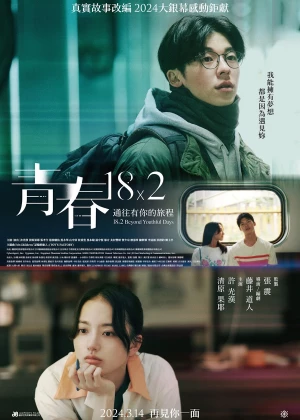18×2 Beyond Youthful Days
Movie details

I'm not exactly sure what deal Michihito Fujii made with Netflix, but it's been a delight having his latest films appear on a global streaming platform. 18×2 Beyond Youthful Days [Qing Chun 18×2 Tong Wang You Ni De Lü Cheng] is the latest one and it sees Fujii tackle yet another genre without losing his trademark touch. People with a soft spot for Asian romance will have a field day with this film, those unfamiliar with the genre will find a perfect introduction. And the best thing of all? Accessibility isn't an issue, because the film is right there on Netflix, just a few clicks away.
![screencap of 18×2 Beyond Youthful Days [Qing Chun 18×2 Tong Wang You Ni De Lü Cheng]](/thumbs/img/articles/1200xauto/18x2-1.webp)
Fujii has been working hard these past couple of years, moving through various genres, and adding his signature to whatever project he decided to tackle. It's not that he's a true auteur, Fujii moves around in more commercial circles and his films end up being pretty easy watches. But there is consistency in his work, whether he's doing drama, fantasy, or crime. It's there in 18×2 too, especially in the way he shoots nature and cityscapes. There's a level of finesse there you usually don't see in more commercial films, which helps his work stand out from its peers.
18×2 is a love letter to Asian romance, notably the work of Shunji Iwai, whose film Love Letter is featured as a narrative element. There's also a nod to Hou here (the hand-holding scene from Three Times - no doubt one of the sweetest and purest displays of affection ever caught on film - is referenced), making this Japanese/Taiwanese crossover a nice homage to some of the films that originally got me into Asian cinema. Fujii's work may be a bit more sentimental than the work he's referencing, but that's to make it more in line with other recent Asian romance movies.
After finishing high school, Jimmy finds himself in a lull. He takes on a job in a nearby karaoke bar to pass the time, but it's not what he expected. Things change when Ami turns up out of nowhere. She's a Japanese traveler who lost her wallet and she's looking for a place to stay. The bar's owner is nice enough to let her a room, and Jimmy is asked to show her around, as he's the only employee who speaks a bit of Japanese. Jimmy takes a fancy to Ami right away, while she keeps a bit more distance. The two get along extremely well though, and as time passes they grow closer.
![screencap of 18×2 Beyond Youthful Days [Qing Chun 18×2 Tong Wang You Ni De Lü Cheng]](/thumbs/img/articles/1200xauto/18x2-2.webp)
Fujii's film always looks pristine and 18×2 is just as polished as his previous work. The camera work lingers when it needs to, the colors are either more muted or popping, depending on the mood of a scene, and the camera always gets the best out of each setting. That doesn't mean this film is over-stylized, the characters and the plot get room to breathe, but there's never a moment where it feels like the cinematography was just an afterthought or a functional bit of filmmaking. If there's anything that ties Fujii's body of work together, it's this exact thing.
The score isn't quite as adventurous, but it possesses a similar finesse. It does get a bit more sentimental at times and I do wish Fujii had reigned it in during the more emotional scenes, especially towards the end of the film. It's not that it screams full-on Hollywood cheese, but the emotions were clear enough that the music didn't need help spell it out for the audience. Still, it could've been a lot worse and during the first 90 minutes or so the music is smooth and pleasant, exactly what you'd expect from this type of film. There's room for improvement there though.
Greg Han Hsu and Kaya Kiyohara are great as the youngsters falling in love while struggling to communicate properly. Their situation has a naturally endearing vibe (it's a personal soft spot, I admit), but they do add to it and make you care without fully grasping where they are exactly in their relationship. The secondary cast is on point too, even though they do little more than guide the couple on their journey. There are no bad performances here and even minor roles (like Chang's and Kuroki's) manage to leave a mark, so the casting couldn't have been better.
![screencap of 18×2 Beyond Youthful Days [Qing Chun 18×2 Tong Wang You Ni De Lü Cheng]](/thumbs/img/articles/1200xauto/18x2-3.webp)
From the get-go, it's obvious that these kids belong together, but something is keeping them apart. The film is set in two different timelines (hence 18×2, the first timeline is when the main character is 18 years old, and the second one is when he's 36). By alternating between the two we slowly learn how their relationship developed and why fate made it so difficult for them to be together. It's a somewhat classic and predictable setup, with familiar twists to boot, but it works and as the execution is flawless, I didn't really mind that much.
Michihito Fujii isn't the kind of director who will reinvent or reshape a genre. Instead, he seems to be better suited to take a familiar formula and give it a contemporary spin (that is, based on his output so far). 18×2 is a loveable, stylish take on Pan-Asian romance cinema, sporting a great cast, a pleasant score, and cozy cinematography, all in support of some heartwarming moments. If you don't care for that kind of thing then this film won't be for you, if you're not familiar with Asian romance cinema and you want to give it a go, this is an ideal place to start.